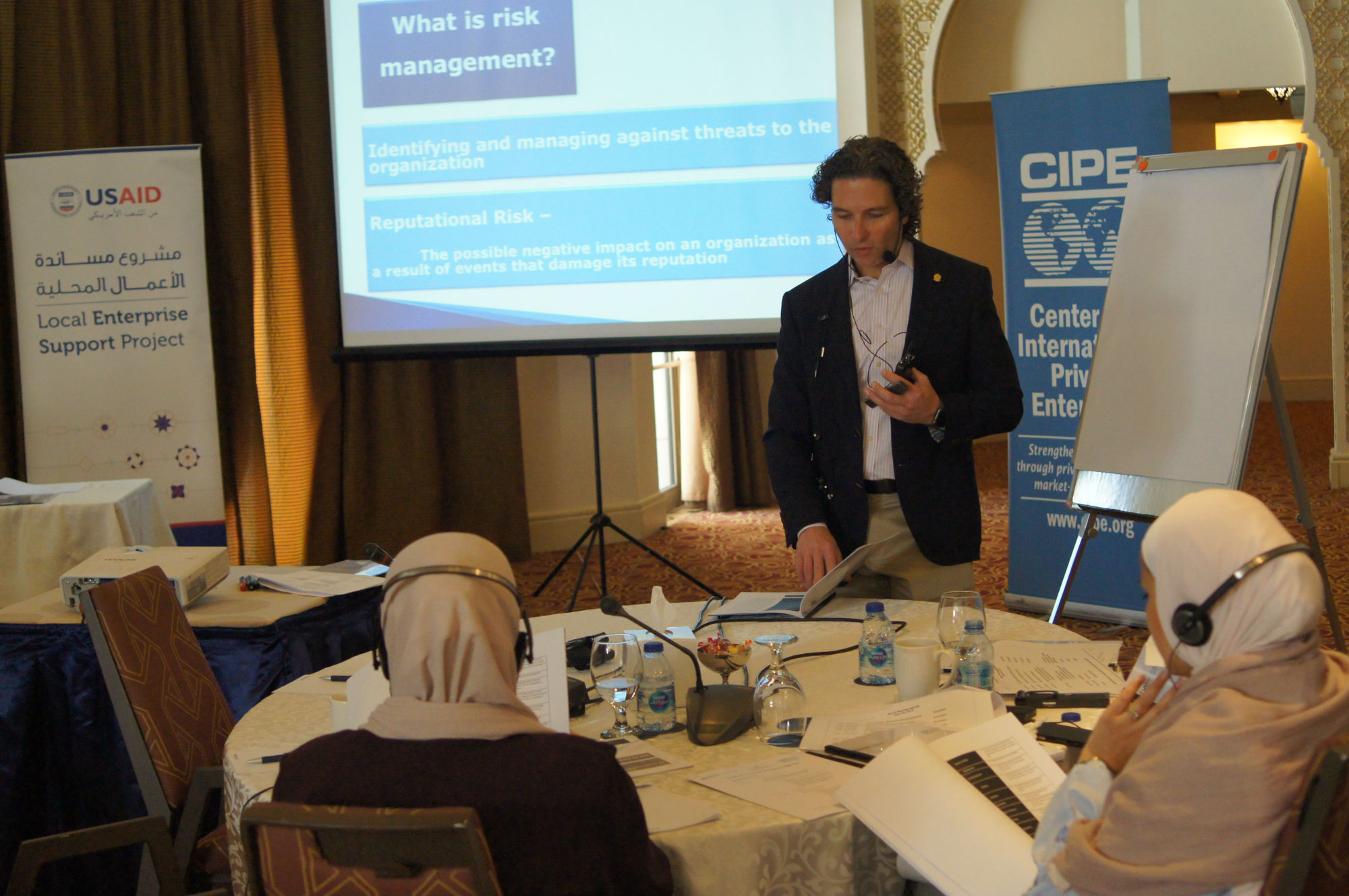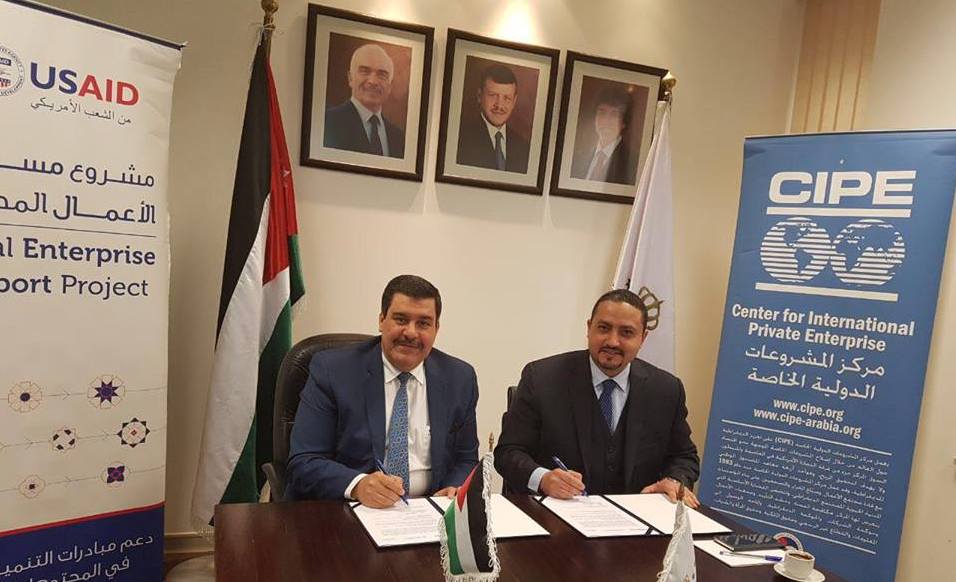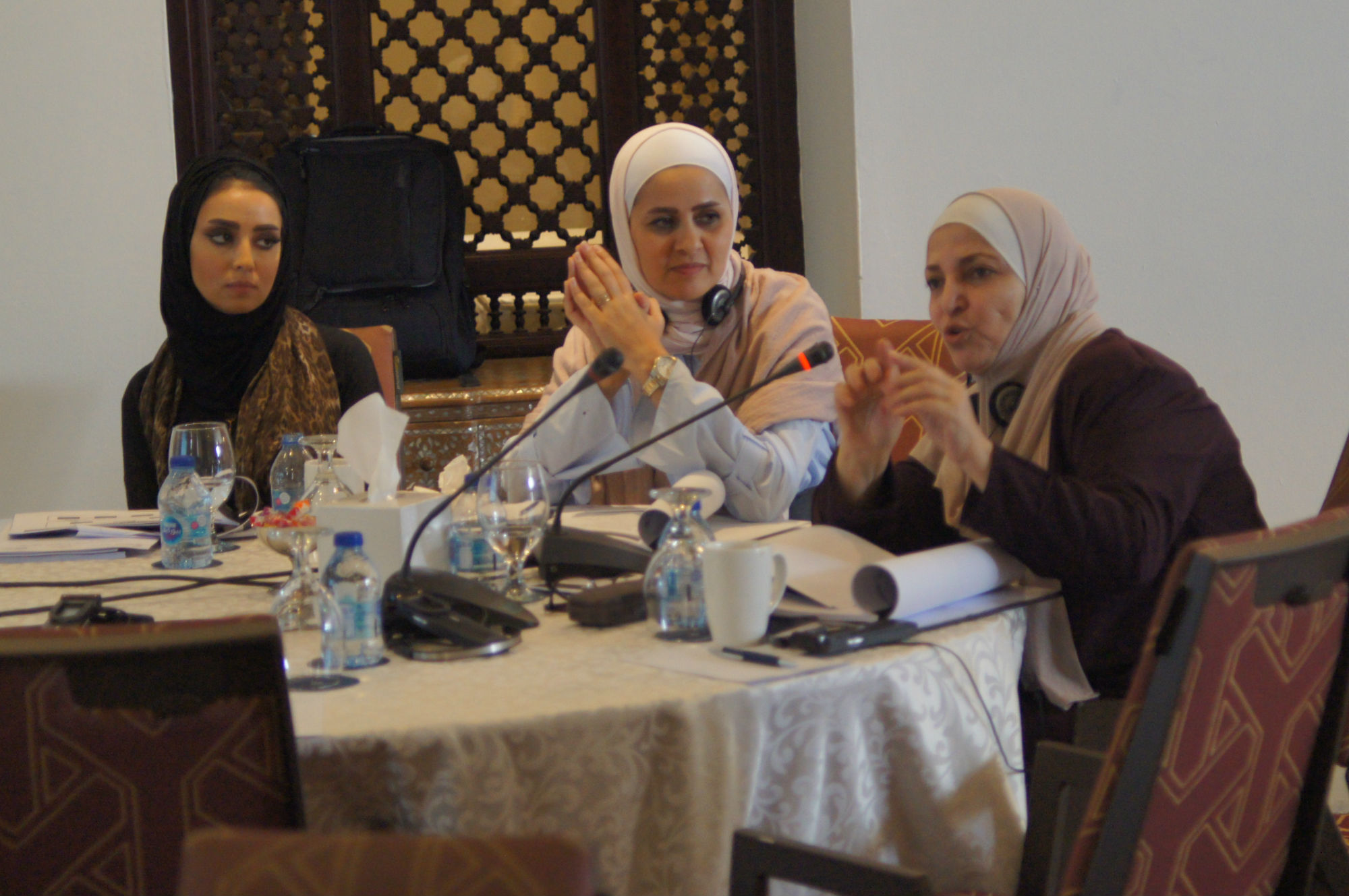This story was prepared by the Center for International Private Enterprise, which has received a grant from USAID LENS to work on supporting and upgrading the services of business associations in Jordan to better serve their micro and small business members.
With the support of USAID LENS and CIPE, the King Abdullah II Center for Excellence is incorporating new curricula into its training services to promote organizational excellence among Jordanian business associations.

KACE trainers (seated) at a USAID LENS supported training-of-trainers workshop, implemented by CIPE, introducing new curricula on business association management customized for Jordan.
Micro and small enterprises (MSEs) are an important component of the Jordanian economy, creating jobs and prosperity in communities throughout the country. These enterprises face significant challenges, however. A lack of business skills and networks, and limited access to finance, are just some of the hurdles MSE owners face when starting and growing their business.
Business associations play a vital role in providing support to these business owners, helping them fill the gaps in knowledge and contacts that stand in the way of their success. The Center for International Private Enterprise (CIPE) has been working with 11 business associations in Jordan to help improve their capacity to provide much needed support to their micro and small enterprise members.
Through a comprehensive program, CIPE helped its partner associations develop the strategic planning, financial management, and member outreach capacity that underpin their ability to deliver support services to members. CIPE’s work in Jordan is made possible through a partnership with the Local Enterprise Support Project funded by USAID Jordan.
CIPE’s Program Director for Jordan, Karim Shaaban, says that while CIPE’s intensive support of the associations has yielded good outcomes for micro and small enterprise members, “it is important to bolster local institutional capacity to ensure these member-based business support organizations continue to flourish and are sustainable.”
With this aim in mind, CIPE partnered with the King Abdullah II Center for Excellence (KACE) to enhance the quality management system for business associations in Jordan. Founded in 2006, KACE’s awards for excellence are considered the most prestigious quality management recognition across all sectors in Jordan.

KACE Executive Director, Dr Ibrahim Rawabdeh (left), and CIPE’s Jordan Program Director, Karim Shaaban, sign a Memorandum of Understanding to promote standards of organizational excellence among Jordanian business associations
Under the partnership, CIPE will support the participation of a number of business associations in KACE’s European Foundation for Quality Management (EFQM) “Commitment to Excellence” program. Assessments conducted through the program will encourage further organizational improvements and identify future goals. In addition, CIPE developed organizational excellence curricula customized for business associations to be incorporated into KACE’s repertoire of training programs.
KACE’s Executive Director, Dr. Ibrahim Rawabdeh, says the program is groundbreaking in the Jordanian context. “By combining CIPE’s 35 years of global experience delivering business association training programs with KACE’s proven track record promoting a culture of organizational excellence, we have developed a world-class training program for Jordanian business associations. The program will encourage associations to adopt international best practices to maximize their effectiveness and impact.”

KACE trainers providing input to the business association excellence training curricula CIPE developed for their use. Input from Jordanian trainers helped CIPE optimize the curricula for the Jordanian context.
KACE trainers who recently participated in a workshop on the new business association curricula said they were excited about the potential of the new program. KACE Training Coordinator, Mais Tarawneh, welcomed the opportunity to provide input to the curricula developed by CIPE, offering suggestions on additional case studies to strengthen the trainings. She says the new program will solidify a culture of continuous improvement for business associations on a national scale. “Because of CIPE’s support, we will be able to train them on business association best practices and help them create action plans for achieving excellence.”
Jordan’s business associations are an essential element of the country’s entrepreneurship ecosystem. The new KACE program will help the associations continue to develop their capacity to provide the services Jordanian MSEs need to be resilient and competitive.
Popular choices
- Casino Non Aams
- Non Gamstop Casinos
- Casinos Not On Gamstop
- Non Gamstop Casino
- Casino Non Aams
- Non Gamstop Casinos UK
- Casino Sites Not On Gamstop
- UK Casino Not On Gamstop
- Non Gamstop Casinos
- Online Casino Uae
- Best Non Gamstop Casinos
- UK Online Casinos Not On Gamstop
- Best UK Casino Sites
- Non Gamstop Casino Sites UK
- Gambling Sites Not On Gamstop
- Online Casinos
- Non Gamstop Casinos UK
- UK Casinos Not On Gamstop
- Casinos Not On Gamstop
- Best Horse Racing Betting Sites
- Top UK Casino Sites
- Non Gamstop Casino
- Best Non Gamstop Casino
- Casino Online Italia
- Casino En Ligne Fiable
- Meilleur Casino En Ligne Belgique
- Casino Non Aams
- 本人確認不要 カジノ
- букмекерские конторы
- オンラインカジノ バカラ
- カジノ ライブ
- Casino Sans Dépôt Avec Bonus Gratuit
- Casino Non Aams Affidabile
- Casino En Ligne Français
- Casino En Ligne
- Bonus Senza Deposito Free Spin
- Casino En Ligne France
- Casino En Ligne
- Nuovi Siti Scommesse



